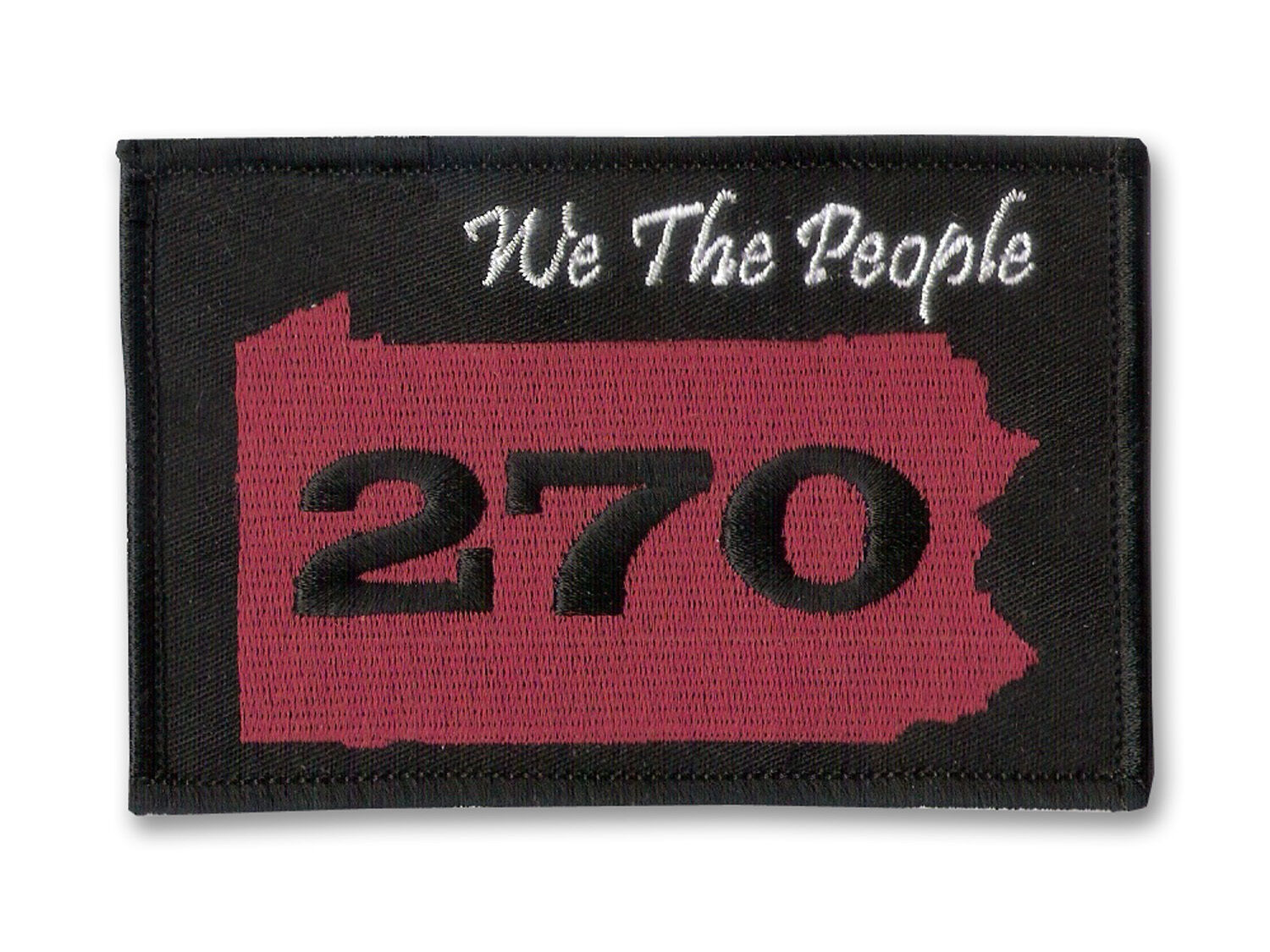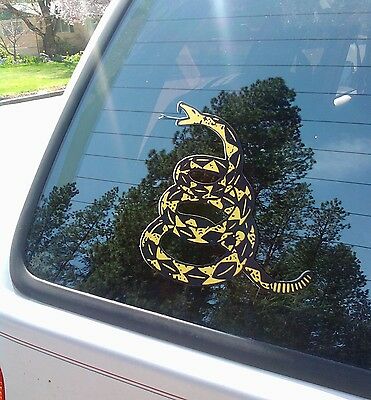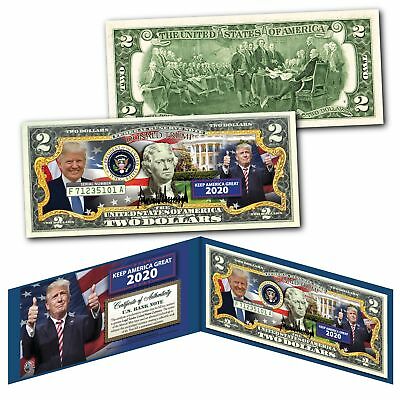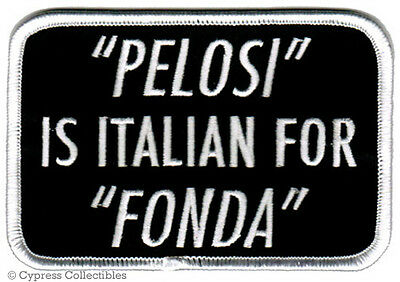-40%
MAGA - Donald Trump - 270 Electoral Votes in Pennsylvania 16 - Embroidered Patch
$ 2.37
- Description
- Size Guide
Description
Jungle Expert PatchMOTORCYCLE - DONALD TRUMP - PENNSYLVANIA ELECTORIAL VOTE
4" X 2 5/8" HIGHLY DETAILED EMBROIDERED PATCH
MERROWED EDGE - WAX BACKING
MOTORCYCLE - DONALD TRUMP - PENNSYLVANIA ELECTORIAL VOTE
4" X 2 5/8" HIGHLY DETAILED EMBROIDERED PATCH
MERROWED EDGE - WAX BACKING
MOTORCYCLE PATCH - IE SUZUKI, YAMAHA, HARLEY DAVIDSON, TRIUMPH, INDIAN, BSA, VICTORY, ETC.
MORALE PATCH - BIKER PATCH - MOTORCYCLE PATCH
The United States presidential election of 2016 was the 58th quadrennial American presidential election, held on Tuesday, November 8, 2016. The Republican ticket of businessman Donald Trump and Indiana Governor Mike Pence defeated the Democratic ticket of former Secretary of State Hillary Clinton and U.S. Senator from Virginia Tim Kaine. Trump took office as the 45th President, and Pence as the 48th Vice President, on January 20, 2017. Concurrent with the presidential election, Senate, House, and many gubernatorial and state and local elections were also held on November 8.
Voters selected members of the Electoral College in each state, in most cases by "winner-takes-all" plurality; those state electors in turn voted for a new president and vice president on December 19, 2016. While Clinton received about 2.9 million more votes nationwide, a margin of 2.1%, Trump won with 57% of electors in the Electoral College, winning 30 states with 306 pledged electors out of 538. He won the perennial swing states of Florida, Iowa and Ohio, as well as Clinton's "blue wall" states of Michigan, Pennsylvania and Wisconsin, which had been Democratic strongholds in presidential elections since the 1990s. Leading up to the election, a Trump victory was considered unlikely by almost all media forecasts.
In the Electoral College vote on December 19, seven electors voted against their pledged candidates: two against Trump and five against Clinton. A further three electors attempted to vote against Clinton but were replaced or forced to vote again. Ultimately, Trump received 304 electoral votes and Clinton garnered 227, while Colin Powell won three, and John Kasich, Ron Paul, Bernie Sanders, and Faith Spotted Eagle each received one.
Trump is the fifth person in U.S. history to become president despite losing the nationwide popular vote. He is the first president without any prior experience in public service or the military, while Clinton was the first woman to be the presidential nominee of the Democratic Party.
This was the first time since the landslide 1984 re-election of Ronald Reagan that Wisconsin voted for the Republican nominee, and the first time since 1988 that the Republican nominee won the states of Pennsylvania and Michigan as well as Maine's 2nd Congressional District. It was also the first time since the 1828 election of Democratic nominee Andrew Jackson that an electoral vote split occurred in Maine.
The United States government's intelligence agencies concluded the Russian government interfered in the 2016 United States elections. A joint US intelligence review stated with high confidence that, "Russian President Vladimir Putin ordered an influence campaign in 2016 aimed at the US presidential election. Russia’s goals were to undermine public faith in the US democratic process, denigrate Secretary Hillary Clinton, and harm her electability and potential presidency. Further, the US intelligence community stated "Putin and the Russian Government developed a clear preference for President-elect Trump."
Hillary Clinton focused her candidacy on several themes, including raising middle class incomes, expanding women's rights, instituting campaign finance reform, and improving the Affordable Care Act. In March 2016, she laid out a detailed economic plan basing her economic philosophy on inclusive capitalism, which proposed a "clawback" which would rescind tax relief and other benefits for companies that move jobs overseas; with provision of incentives for companies that share profits with employees, communities and the environment, rather than focusing on short-term profits to increase stock value and rewarding shareholders; as well as increasing collective bargaining rights; and placing an "exit tax" on companies that move their headquarters out of America in order to pay a lower tax rate overseas. Clinton promoted equal pay for equal work to address current alleged shortfalls in how much women are paid to do the same jobs men do, promoted explicitly focus on family issues and support of universal preschool, expressed support for the right
to same-sex marriage, and proposed allowing undocumented immigrants to have a path to citizenship stating that its at its heart a family issue."
Donald Trump's campaign drew heavily on his personal image, enhanced by his previous media exposure. The primary slogan of the Trump campaign, extensively used on campaign merchandise, was Make America Great Again. The red baseball cap with the slogan emblazoned on the front became a symbol of the campaign, and has been frequently donned by Trump and his supporters. Trump's right-wing populist positions—reported by The New Yorker to be nativist, protectionist, and semi-isolationist—differ in many ways from traditional conservatism. He opposed many free trade deals and military interventionist policies that conservatives generally support, and opposed cuts in Medicare and Social Security benefits. Moreover, he has insisted that Washington is "broken" and can only be fixed by an outsider. Trump support was high among working and middle-class white male voters with annual incomes of less than ,000 and no college degree. This group, particularly those with less than a high-school education, suffered a decline in their income in recent
years. According to The Washington Post, support for Trump is higher in areas with a higher mortality rate for middle-age white people. A sample of interviews with more than 11,000 Republican-leaning respondents from August to December 2015 found that Trump at that time found his strongest support among Republicans in West Virginia, followed by New York, and then followed by six Southern states.
Clinton had an uneasy, and at times adversarial relationship with the press throughout her life in public service. Weeks before her official entry as a presidential candidate, Clinton attended a political press corps event, pledging to start fresh on what she described as a "complicated" relationship with political reporters. Clinton was initially criticized by the press for avoiding taking their questions, after which she provided more interviews.
In contrast, Trump benefited from free media more than any other candidate. From the beginning of his campaign through February 2016, Trump received almost billion in free media attention, twice the amount that Clinton received. According to data from the Tyndall Report, which tracks nightly news content, through February 2016, Trump alone accounted for more than a quarter of all 2016 election coverage on the evening newscasts of NBC, CBS and ABC, more than all the Democratic campaigns combined. Observers noted Trump's ability to garner constant mainstream media coverage "almost at will". However, Trump frequently criticized the media for writing what he alleged to be false stories about him and he has called upon his supporters to be "the silent majority". Trump also said the media "put false meaning into the words I say", and says he does not mind being criticized by the media as long as they are honest about it.
Both Clinton and Trump were seen unfavorably by the general public. In consequence, the controversial nature of both main parties' campaigns marked the road to the election.
Clinton's practice of using her own private email address and server during her time as Secretary of State, in lieu of State Department servers, gained widespread public attention back in March 2015. Concerns were raised about security and preservation of emails, and the possibility that laws may have been violated. After allegations were raised that some of the emails in question fell into this so- called "born classified" category, an FBI probe was initiated regarding how classified information was handled on the Clinton server. The FBI probe was concluded on July 5, 2016, with a recommendation of no charges, a recommendation that was followed by the Justice Department. On October 28, eleven days before the election, FBI Director James Comey informed Congress that the FBI was analyzing additional emails obtained during its investigation of an unrelated case. On November 6, he notified Congress that the new emails did
not change the FBI's earlier conclusion.
Also, on September 9, 2016, Clinton stated: "You know, just to be grossly generalistic, you could put half of Trump's supporters into what I call the basket of deplorables. They're racist, sexist, homophobic, xenophobic, Islamaphobic—you name it." Donald Trump criticized Clinton's remark as insulting his supporters. The following day Clinton expressed regret for saying "half", while insisting that Trump had deplorably amplified "hateful views and voices". Previously on August 25, 2016, Clinton gave a speech criticizing Trump's campaign for using "racist lies" and allowing the alt-right to gain prominence.
On the other side, on October 7, 2016, video and accompanying audio were released by The Washington Post in which Trump referred obscenely to women in a 2005 conversation with Billy Bush while they were preparing to film an episode of Access Hollywood. The audio was met with a reaction of disbelief and disgust from the media. Following the revelation, Trump's campaign issued an apology, stating that the video was of a private conversation from "many years ago". The incident was condemned by numerous prominent Republicans like Reince Priebus, Mitt Romney, John Kasich, Jeb Bush and the Speaker of the House Paul Ryan. By October 8 several dozen Republicans had called for Trump to withdraw from the campaign and let Pence head the ticket. Trump insisted he would never drop out.
The ongoing of the election made third parties attract voters' attention. On March 3, 2016, Libertarian Gary Johnson addressed the Conservative Political Action Conference in Washington DC, touting himself as the third-party option for anti-Trump Republicans. In early May, some commentators opined that Johnson was moderate enough to pull votes away from both Hillary Clinton and Donald Trump who are very disliked and polarizing. Both conservative and liberal media noted that Johnson could get votes from "Never Trump" Republicans and disaffected Bernie Sanders supporters. Johnson also began to get time on national television, being invited on ABC News, NBC News, CBS News, CNN, Fox News, MSNBC, Bloomberg, and many other networks. In September and October 2016, Johnson suffered a "string of
damaging stumbles when he has fielded questions about foreign affairs." On September 8, Johnson, when he appeared on MSNBC's Morning Joe, was asked by panelist Mike Barnicle, "What would you do, if you were elected, about Aleppo?" (referring to a war-torn city in Syria). Johnson responded, "And what is Aleppo?" Johnson's "what is Aleppo?" question prompted widespread attention, much of it negative. Later that day, Johnson said that he had "blanked" and that he did "understand the dynamics of the Syrian conflict – I talk about them every day."
On the other hand, Green Party candidate Jill Stein stated that the Democratic and Republican parties are "two corporate parties" that have converged into one. Concerned by the rise of the far right internationally and the tendency towards neoliberalism within the Democratic Party, she has said, "The answer to neofascism is stopping neoliberalism. Putting another Clinton in the White House will fan the flames of this right-wing extremism."
In response to Johnson's growing poll numbers, the Hillary Clinton campaign and Democratic allies increased their criticism against Johnson in September 2016, warning that "a vote for a third party is a vote for Donald Trump" and deploying Senator Bernie Sanders (Clinton's former primary rival and then-supporter) to win over voters who might be considering voting for Johnson or for Stein.
The election was held on November 8, 2016. Democratic candidate Hillary Clinton cast her vote in the New York City suburb of Chappaqua, while Republican candidate Donald Trump voted in a Manhattan public school. Throughout the day, the election process went more smoothly than many had expected, with only a few reports of long lines and equipment problems.
The Republican candidate performed surprisingly well in all battleground states, especially Florida, Ohio and North Carolina. Even Wisconsin and Michigan, states that were predicted to vote Democratic, were won by Trump. Cindy Adams, present at Trump Tower, reported that "Trumptown knew they’d won by 5:30. Math, calculations, candidate dislike causing voter abstention begat the numbers".
On November 9, 2016, at 3:00 AM Eastern Time, Trump secured over 270 electoral votes, the majority of the 538 electors in the Electoral College, enough to make him the president-elect of the United States. Clinton called Trump early on Wednesday morning, conceding defeat. Clinton asked her supporters to accept the result and hoped that Trump would be "a successful president for all Americans". In his victory speech Trump appealed for unity saying "it is time for us to come together as one united people" and praised Clinton who was owed "a major debt of gratitude for her service to our country".
Six states plus a portion of Maine that Obama won in 2012 switched to Trump. These are (with Electoral College votes in parentheses): Florida (29), Pennsylvania (20), Ohio (18), Michigan (16), Wisconsin (10), Iowa (6), and Maine's second congressional district (1). Initially, Trump won exactly 100 more Electoral College votes than Mitt Romney in 2012, with two lost to faithless electors the following month. Thirty-nine states swung more Republican compared to the previous Presidential election, while eleven states and the District of Columbia swung more Democratic.
It is estimated that 138.8 million Americans cast a ballot in 2016. 65.8 million of those ballots have been counted for Clinton and just under 63 million for Trump, representing 20.3% (Clinton) and 19.4% (Trump) of the U.S. Census Bureau estimate of U.S. population that day of 324.9 million. Considering a voting age population (VAP) of 251.1 million people and voting eligible population (VEP) of 230.6 million people, this is a turnout rate of 55.3% VAP and 60.2% VEP. Voting turnout percentage was up compared to 2012 (54.9% VAP) but down compared to 2008 (58.2% VAP). More votes were cast in the 2016 election than any prior election due to an increase in the voting population.









